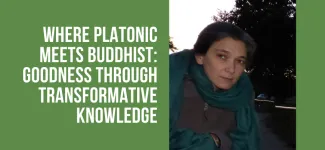Imagine a Platonist and a Buddhist discussing the ultimate moral task.
Like most conversations, at least conversations of the academic debate variety, there are many points where people might disagree. Yet, it is Yale-NUS philosopher Amber Carpenter’s task to discover where they might, surprisingly, agree on knowledge, virtue and the goal of living a moral life.
Amber Carpenter’s project is to witness, in many ways, a conversation between two traditions of thought: Platonic and Buddhist. As the Cecil H. and Ida Green Visiting Professor in March, she presented her viewpoint on this conversation at Green College to a group of attendees in the Coach House.
“I think it can plausibly be claimed,” Amber began, “that ancient moral thought has more in common with each other than any ancient tradition, including Ancient Greek, has in common with contemporary moral thought.”
Among the commonalities between ancient schools of thought, however, the choice of Platonic views, especially as set out in The Republic and in several dialogues, and Classical Indian Buddhist thought in its first millennium, for Amber, is based on the belief that the two have so much in common that they stand out in the ancient world.
The purpose of picking out these commonalities is part of Amber’s three-fold purpose to show that both Buddhists and Platonists 1.) work with a conception of “ideal knowledge” as something that is both difficult to attain and also very different from the cognitive acts we do every day; 2) they take this ideal knowledge, the striving for and attaining of it, to be the “primary and indispensable mechanism for eliciting a wholesale transformation of the person”; and 3) they take such a transformation to be necessary, and to be the only and superordinating end goal. “There is no other moral task but this, and no other task but this moral one,” she explained of Platonic and Buddhist conceptions of the striving for ideal knowledge.
This idea of knowledge as the end goal of moralism is different, Amber argued, from the “naturalist” one espoused by Aristotle and followers, for whom being a good thing is dependent on what kind of thing you are. Once one knows the criteria of what constitutes the flourishing of a particular kind of thing, one knows where one measures up with regards to those criteria.
For Platonists, she argues, rather than being the best possible version of a particular kind of thing, it is “knowledge which leads and organizes in making life and individuals good.” For Buddhists as well, Amber said, “the main goal is not to become a good thing of the human kind.” Rather, it is the aim of “knowing reality as it is, which for the Buddhist is identical with the cessation of suffering.”
It was slightly reassuring to hear Amber explain that this ideal knowledge is not something we are already expected to have. On the contrary, one of the distinguishing features of this conception of knowledge that Platonists and Buddhists both work with is that we do not already have it. It was slightly less reassuring, especially for an academic, to then hear that “it’s not just that we don’t have the necessary knowledge required for moral success, whatever that might be, it’s that we don’t have knowledge at all, on the whole.”
“Both Buddhist and Platonist,” she explained, “work with a conception of knowledge and of our current or ordinary condition according to which we all lack knowledge and indeed go through our lives deeply confused.”
Both Buddhist and Platonist, Amber went on, work with ideal epistemologies, wherein the goal is not to analyze what we already know, but to work out the “ideal cognitive condition.” The nature of that condition is not agreed upon between Platonist and Buddhist thought. However, Amber expressed that her interest lies in their different articulations of a similar concept of an ideal cognitive condition as the goal or end of morality, as the way of escaping the confusion of our natural unknowledgeable condition. It also sets up a high bar—goodness is not attainable through everyday acts or thoughts, by these ways of thinking, but only through the extremes of ideal knowledge, which leads to transformation of the self.
Ideal knowledge, according to the Platonist and Buddhist alike, should be sought not for its own sake but because such knowledge is fundamentally transformative. Such transformation is not only our “primary task,” Amber lectured. “Indeed, it is in some sense, our only task.”
The search for knowledge is long and hard, a truth to which every Resident Member of Green College could vehemently attest. Yet, the promise of transformation of the self, of seeing things as they really are, is an enticing one that might keep many going through the end of semester crunch and into the bright days of summer ahead.
Amber Carpenter is an Associate Professor of Humanities (Philosophy) at Yale-NUS University. Amber has held/taught visiting research appointments at the universities of Cornell, Melbourne, Oxford, St. Andrews, Yale and York, and recently completed a fellowship with the Beacon Project. Learn more about her curent, international grant-funded project on Buddhism Platonism here.
Amber Carpenter spoke at Green College on March 29, 2022 in a Cecil H. and Ida Green Visiting Professor Lecture titled "Knowledge and Goodness: A Buddhist-Platonic Alternative."
Post by: Jane Willsie, Department of English Language and Literature, UBC and Green College Work Learn Content Writer, 2022.
